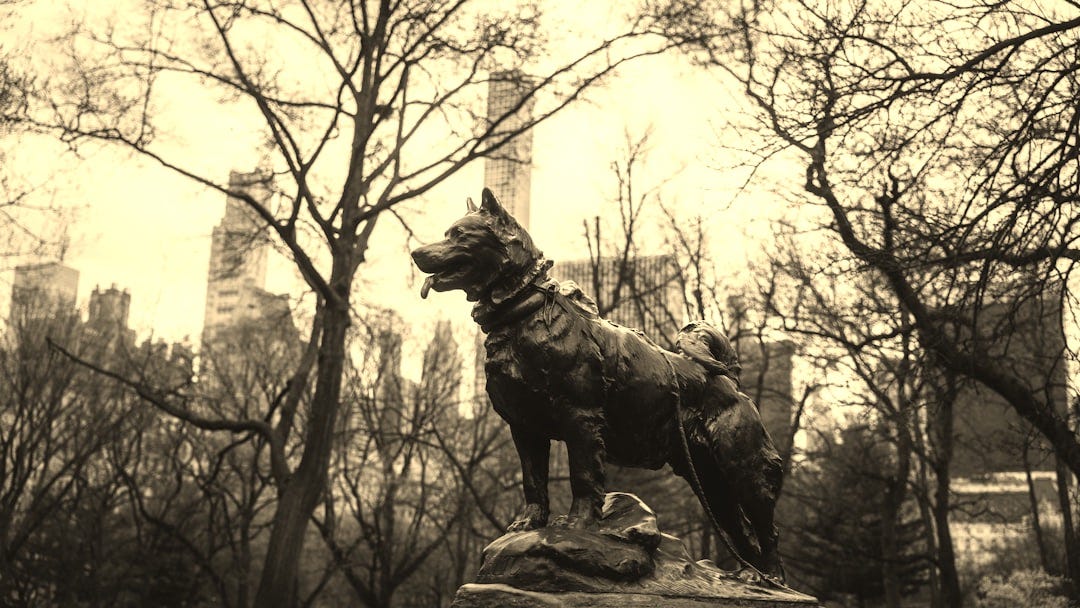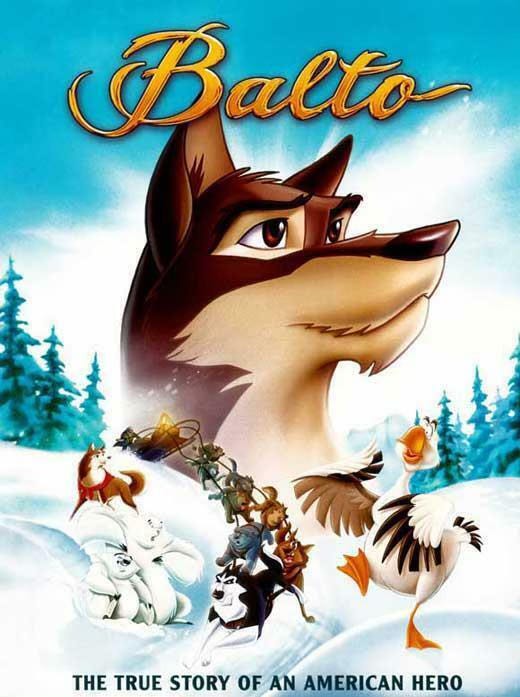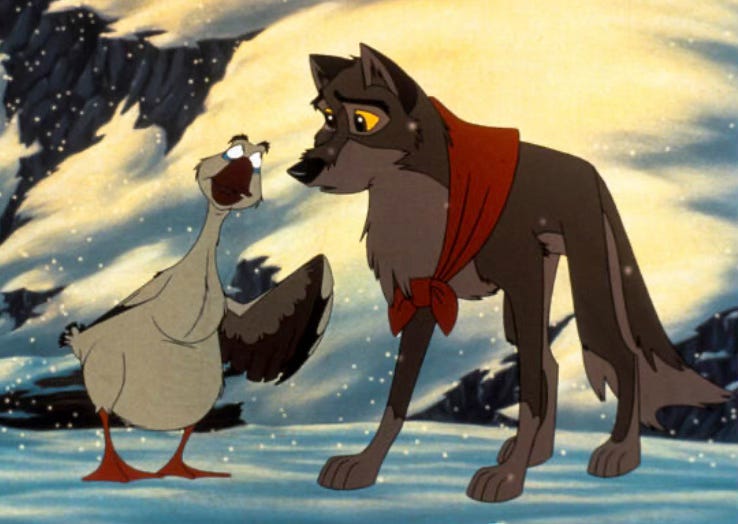
There was a time when loyalty was everything. A time when it was not just a word but a currency that bound people together, stronger than blood, forged in hardship and fire. In conflict and chaos, loyalty is instinct, pack instinct. You protect the members of your pack because they protect you. There is no thought, no hesitation, only the knowledge that survival depends on the strength of the bond. But then the conflict ends. You are forced to leave the pack, now older and slower than the new members. The pack dissolves, reassembled on the backs of the young and inexperienced. And suddenly, you enter a world that operates by different rules. Loyalty is no longer about survival but something softer, more abstract. Something that too often feels hollow.
The film Balto1 tells the story of an outcast caught between two worlds. Part wolf, part dog, he belongs to neither. The wolves see him as too domesticated, too close to the world of men. The dogs see him as a threat, something wild and unpredictable. And so he walks alone, unclaimed by either side, struggling to find his place. It is a story that resonates with many who have left the military. No longer a warrior, not quite a civilian, adrift.
The Loyalty Divide: Pack vs. Domestication
A wolf’s loyalty is earned. It is conditional, built on strength and necessity. The pack survives because each member plays their role, and weakness is not tolerated. The military is no different. Membership to the pack is not given; it is forged in the shared crucible of suffering and discipline. You are only as good as your ability to endure, to contribute, to uphold the mission. That kind of loyalty is rigid, unyielding, an unspoken contract.
Dogs, on the other hand, are loyal without condition. They follow without question, seek approval, and trust easily. Civilian loyalty is often like this: fluid, adaptable, sometimes fleeting. It is a different language, one many veterans struggle to speak. In the military, you could trust that your pack would be there when it mattered most. In the civilian world, friendships come and go, shaped by convenience rather than necessity. Like Balto, a veteran is caught between these two worlds, unable to be fully one or the other.
To be caught between both worlds is to exist in a limbo where you are forever a stranger. The disciplined instincts of the warrior do not fade overnight, but the world you return to no longer operates by the rules that once defined your existence. You are too structured, too intense, too prepared. An artifact of a past life that the civilian world neither understands nor accommodates. Yet, you are also no longer fully part of the warrior class; you have left the battlefield, relinquished the uniform, and now walk among those who have never known the weight of service. You are recognized by neither, claimed by neither.
This is not merely about struggling to fit in, it is about questioning if you ever truly belonged in either world to begin with. You were trained to be a warrior, yet you were born a civilian. You return to a life that feels unfamiliar, not because it changed, but because you have. There is a profound loneliness in this realization, a quiet grief for the sense of purpose that came with the fight. The challenge is not in finding a new pack but in learning to walk alone without losing yourself to isolation. Strength is not in belonging but in forging meaning in the space between.
The Outcast’s Dilemma
Balto’s struggle is not just about acceptance but about self-definition. He could try to prove himself to the dogs, force them to see him as one of their own. He could disappear into the wilderness, live as a wolf, severing his ties to humanity. But neither path is truly his. Instead, he must find his own way, one that does not require choosing between two incomplete identities.
For veterans, the transition is much the same. Some try to assimilate, burying their past, suppressing the instincts honed over years of service. Others retreat, isolating themselves, rejecting civilian life entirely. But neither path offers peace. The answer lies in embracing what is, rather than mourning what was. You are no longer just a warrior, but you will never be just a civilian. You are something else, something more.
Many veterans struggle with this realization, wrestling with an identity that no longer fits neatly within the bounds of their past or their present. They may feel unmoored, lacking a clear purpose, but it is in this uncertainty that opportunity lies. The freedom to define oneself beyond the constraints of military service is not a burden, it is a gift. It is the space where experience, resilience, and wisdom can be reshaped into something meaningful, something uniquely their own. But to seize it, one must let go of the idea that identity is dictated by belonging to a specific group. True strength comes not from fitting into a predetermined role, but from forging a path that reflects the full depth of one's experiences.
Some veterans become villains not because society cast them that way, but because they embraced it. There is no honor in using past scars as an excuse for cruelty. These men have not merely lost their sense of loyalty, they have corrupted it, warping their bonds into tools of control, wielding their pain as justification for inflicting it on others. Rather than standing against their demons, they surrender to them, forsaking the strength that once defined them in favor of destruction. In doing so, they become something far worse than outcasts; they become lost.
Loyalty from Unexpected Places
There is a quiet irony in Balto: his most steadfast companion is not a wolf, not a dog, but a goose. Boris, a seemingly foolish bird, stands by Balto when no one else will. It is easy to dismiss him, to see him as comic relief, but in nature, geese are among the most fiercely loyal and protective animals. They mate for life, defend their own with relentless determination, and never abandon the flock.
This detail is more than narrative convenience; it is a truth many veterans come to realize. Loyalty, real loyalty, does not always come from the places you expect. Many assume their strongest bonds will remain with those they served with, but time changes things. People move on, take different paths. The loyalty that remains is not always from the warrior brotherhood but sometimes from those who have never seen true violence, who cannot understand its weight but still choose to stand beside you. A civilian friend, a spouse, even a stranger. Loyalty, true loyalty, is about presence, not background.
Civilians, though they may not share the same experiences, can offer invaluable support. Their role is not to understand the battlefield but to provide stability in the aftermath. They can be the grounding force that reminds veterans they are more than their past service. Simple acts like listening without judgment, offering companionship without expectation, and creating dialogue where a veteran does not have to explain themselves, can build bonds that rival those formed in chaos. In many ways, the loyalty of a civilian is the ultimate test of devotion. It is not born out of necessity or shared survival but of choice. And sometimes, that chosen loyalty is the strongest kind of all.
Boris does not try to make Balto more wolf or more dog, he does not attempt to force him into a mold that does not fit. Instead, he sees Balto for who he is and reminds him of his worth. He motivates him, supports him, and helps him see his own strength when self doubt clouds his vision. Likewise, civilians who wish to support veterans do not need to change them or push them to 'adjust’. They only need to stand by them, to recognize the value they still hold beyond their service, and to encourage them to embrace the person they have become. Just as Boris helped Balto find his own path, civilians can help veterans do the same. Not by directing them, but by reminding them they are capable of leading themselves.
Choosing to Be Whole
Balto does not seek validation. He does not beg for acceptance. He does not compromise who he is to fit someone else’s mold. He leads the sled team through the storm not because he wants to prove himself but because it is what he was meant to do. He is determined to save a little girl, Rosy, who needs someone stronger than she has. He was not chosen for the mission; in fact, he was actively dismissed and ridiculed. Yet, he stepped forward because he could not stand idly by while others suffered. This mirrors the idea that some individuals are compelled to act, not out of obligation, but because their very nature demands it. This is where Balto shines, he takes on the challenge that he knows will test his strength and endurance. One that most likely will cost him everything, but he has seen death before. He knows its face and uses this experience to do what no one else was willing to do. Step into the fray, to save a little girl, and ultimately the whole town.
This is not just about heroism, it is about duty, about something ingrained in the very bones of those who were born for the fight. This idea is explored further in my previous essay, Some Are Born To Fight, where the compulsion to step forward is not a choice but a fundamental part of one's nature. Balto does not act because he seeks glory or recognition; he acts because he cannot do otherwise, just as some warriors run into chaos not for honor, but because standing idle would mean forsaking their very essence. Balto does not hesitate because hesitation is not an option. He does not question if it is his responsibility because he already knows the answer. Some step forward because they cannot do otherwise, because the weight of inaction is greater than the weight of sacrifice. In that, Balto is no different from one who marches toward the fire, not for glory, not for recognition, but because to do otherwise would mean forsaking who he is.
From Both Worlds
Being from both worlds, the very thing that makes some veterans an outcast, is what makes them the strongest. Born a civilian but forged into a warrior, they carry the experience of chaos while retaining the adaptability of the world they left behind. Balto has the endurance of the sled dogs and the instincts of the wolves. He is not half of each but the best of both. He was not made to belong to either world, he was made to endure, to fight, and ultimately, to lead.
Veterans, too, carry the best of two worlds. The discipline, resilience, and clarity forged in service do not vanish once the uniform comes off. But there is also wisdom to be gained from the civilian world: perspective, adaptability, the ability to exist without constant wariness. The struggle is not in choosing one or the other but in integrating both.
This integration requires selfawareness and patience. It is not a seamless transition, nor is it one that happens overnight. Many veterans find themselves resisting aspects of civilian life, feeling as though adapting would mean betraying the person they became in service. But true strength does not come from clinging to a singular identity; it comes from evolving beyond it. The same instincts that once ensured survival in chaos can be repurposed for success in the civilian world. Leadership, resilience, critical thinking, calm under pressure, complex problem solving, these traits do not fade; they only need to be redefined.
Like Balto, veterans do not need to prove themselves to anyone but themselves. They do not need to shed their past to embrace their future. Instead, they must learn to see that they are more than warriors; they are thinkers, builders, leaders. They are not trapped between two worlds but enriched by both. The key is in recognizing that the path forward is theirs to shape.
Conclusion: A Loyalty to Oneself
The hardest lesson is that loyalty cannot always be external. For those who spent years bound by duty to others, the idea of self-loyalty can feel foreign, selfish even. But it is necessary. True peace comes not from seeking a new pack but from becoming one’s own foundation.
Balto’s story is one of belonging, but not in the way he expected. He does not find a pack, he builds one. He does not conform, he transforms. Veterans, too, must stop searching for a home that no longer exists. The world is not the battlefield, nor is it a place of peace. It is something else entirely, and it is yours to shape.
But what if there is no true home at all? What if belonging itself is an illusion, a construct meant to comfort those who fear walking alone? Balto does not find resolution in fitting in, he finds it in moving forward despite the ambiguity of his existence. Likewise, the veteran must come to terms with a truth few dare confront: there is no single destination, no final answer, only the absurdity of forging ahead with no guarantee that the path leads anywhere at all. And yet, that is where strength is found: in the choice to persist, to carve meaning from an indifferent world, to embrace not a singular identity but the fluidity of being.
In embracing the ambiguity of their new identity, veterans can find strength. Like Balto, they are neither fully of their past nor entirely of their present and therein lies their unique power. By accepting this fluid state of being, they can forge a path that honors their service while embracing civilian life, finding loyalty not in external validation, but in the courage to persist in the face of uncertainty.
Like Balto, you were never meant to be just one thing. You are not just a wolf, not just a dog. You are something more. And that is your greatest strength.
¹Spielberg, S. (Executive Producer), Wells, S. (Producer), & Simon, S. (Director). (1995). Balto [Animated film]. Universal Pictures.









Went back and re-read this one as it was so good. ❤️ Actually there are 3 types of people - Those who watch what happens…….Those who make things happen……and Those who wonder what the fuck just happened - Capt. Phil Harris🤘 🪿 🐺
The clearest window into your world I’ve looked into so far - I’m proud you are able to find these words and the strength to share them for others to read and pull from. Some of us find countless similarities in your story, unable to process and find the words to explain the constant internal struggle to find a place of true peace and this struggle is more common then you may realize - instead of comparing different paths though separate lives I think this cannot be labeled as a veterans journey or a civilians journey - but as a human journey. Are you sure Boris was a Goose? I’m pretty sure he was a majestic Eagle ❤️